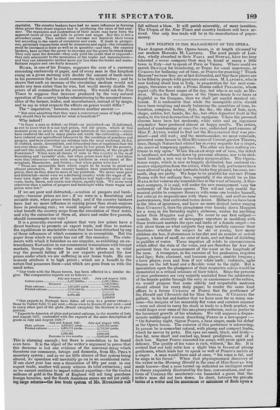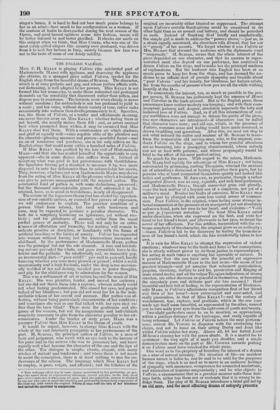NEW POLITICS IN THE MANAGEMENT OF THE OPERA.
THAT Augean stable, the Opera-house, is at length cleansed by our modern Hercules M. LAPORTE. The good people of Lon- don, wholly absorbed in their PASTA and SONTAG, have too long tolerated a worse company than may be found at many a little town in Italy—not to speak of Paris or Vienna. Where could we match DEVILLE for blundering, or TORRI for vocal impotence, or CURIONI for hallooing out of tune, or PORTO for growling ? Thank Heaven! we hear they are at last disbanded, and that their places are to be filled by people with good ears and voices. M. LAPORTE, who is now looking about him in Italy, in preparation for his next cam- paign, threatens us with a Prima Donna called PESARON1, whom report calls the finest singer of the day, but who is as ugly as Me- dusa. When the first singers of the Opera-house have faces as frightful as the Gorgons, then we shall get candid musical cri- ticism. It is undeniable that while the susceptible critic should have been weighing and nicely balancing the quantities of tone, in- tonation, compass, feeling, style, &c. &c., the idea of hair, eyes, shape, ankles, feet, hands, &c. &c., has often deposited itself in the scales, to the total destruction of the equipoise. Where the personal charms have been but moderate, white satin and an ingenious staymaker have produced almost as happy results. The critics,. instead of condemning at once the raw, unfinished performance oi Miss F. AYTON, waited to find out the BILLINGTON that was pro- mised—and still wait ; and the mantuamaker, we must conclude, procured some favour to Miss HuonEs.of Covent-garden Theatre, since, though Nature had stinted her in every requisite for a singer, she received temporary applause. The other sex have nothing ex- trinsic to rely upon.* When 13n.A.HAm sings out of tune, the defect is barefaced, not softened down by personal charms, nor to be shel- tered beneath a new wig or buckskin inexpressibles. The Opera- house corps, which is now so happily disbanded, has endured ex, cessive objurgation from the critics, while the lady performers have been allowed to play what fantastic tricks they pleased, because, for- sooth, they are pretty. We hope to be grateful for our new Prima Donna with her ordinary face, especial]; if she should be as like. MARA. in her voice as she resembles her in the want of beauty. A Ger- man company, it is said, will under the new management vary the uniformity at' the Italian operas. This will not only enable the musical public to compare ItossiNi with some one besides himself, but enlarge its acquaintance with those correct, and well-in-tune. performances, that cultivated tastes desire. Hitherto we have been in the bliss of ignorance, and have no more desired better singing, than CURIONI'S, than the ploughman who- knocks down Muggins; for a song in his Saturday night's alehouse, wishes for anything; better than Muggins can give. To recur to our first subject— namely, the absurdity of newspaper reporters in meddling with: these irrelevant matters the eyes and limbs of a female singer—we will show them on what subjects they may lawfully exercise their functions: whether the subject be old or young, how many children she has, if abstemious in her diet and an avaider of ardent liquors, a hater of snuff, no eater of nuts, and not fond of dabbling in puddles of water. These inquiries all relate to circumstances which affect the state of the voice, and are therefore far less im- pertinent than the measurement of the waist or the longitude of the nose. A trumpeter, in the exercise of his profession, requires hard lips ; flute, clarionet, and bassoon players, nimble tongues ; a horn player, even and firm if not white teeth ; violinists, agile fingers on the left hand and a flexible wrist to the right. But a. speculation upon the plumpness of their respective calves would he immaterial in a critical estimate of their talent. Since the persons of men performers are very unjustly excluded from the admiration of the female public through the envy or carelessness of the critics, we would propose that some elderly and respectable matrons should attend for every daily paper, to render the same kind offices to a future CURIONI or PORTO that the gentlemen of the Herald and Chronicle did for Miss SONTAG. If'CURIONI the gallant, in his hat and feather that we have seen for so many sea- sons—the insignia of his miserably flat voice and careless manner —were not about to carry his stock in trade to a fresh market, we would linger over some of this imaginary criticism, and do justice to the luxuriant growth of his whiskers. We will suppose a dispas- sionate middle-aged woman describing PORTO in a newspaper :— " On Saturday night, Signor PORTO, a bass singer, made his debut at the Opera-house. The exterior of this performer is interesting. In person he is somewhat rotund, with plump and compact limbs, which he moves by jerks. His eyes are small, black, and lively— face fat, nose short and cocked up, beard prodigious, and of a dark hue. Signor PORTO executed his songs with great spirit and delicacy. The quality of his voice is rich, without," &c. &c. It is evident that our lady critic has a slight bias in favour.of plump gentlemen, which leads her to speak so well of PORTO.S merits as a singer. A man would have said at once, "his voice is fat, and he sings in his throat." When that physiognomical discovery of the writer in the Morning Herald in the case of Miss SONTAG was made known—that a nose turned up indicated an intelligent mind (a theory exquisitely illustrated by the face, conversations, and ac- tions of CORDER the murderer)—we hazarded a guess that the critic's nose did not turn down. In short, between the private
tastes of a writer and the maximum or minimum of flesh upon a
singer's bones, it is hard to find out how much praise belongs to her as an artist—how much to her configuration as a woman. If the contour of limbs be disregarded during the next season of the Opera, and good honest ugliness come into fashion, music will be better listened to and better glorified. It checks our mirth on this subject when we think, that Miss CORRI, who was one of the most rarely-gifted singers this country ever produced, was driven from it to seek her fortune in Italy, merely because her face was not to the taste of some of our dandy nobility.



















 Previous page
Previous page